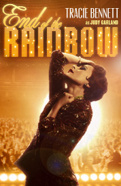End of the Rainbow Playwright Peter Quilter on the Danger, Joy and Electricity of Judy Garland
About the author:
Peter Quilter is a two-time Olivier Award-nominated playwright who is making his Broadway debut with the acclaimed biographical drama End of the Rainbow. Set in London in 1968, End of the Rainbow dramatizes the final months of superstar Judy Garland, portrayed onstage by Tracie Bennett. The play premiered in Australia in 2005 before spawning productions in London, Finland, Brazil, Poland and now New York. Given the amount of time Quilter spent researching Garland and working on this play, Broadway.com figured he could convey unique insight into the iconic The Wizard of Oz star and concert artist—and boy, were we fascinated by what we learned!
![]()
There’s a natural assumption that I just sat down one day and decided to write a play about Judy Garland. But I didn’t. It all sparked off several years ago when I went to visit a friend who worked as an entertainer on cruise ships. I floated about with him for a few weeks, and during that period there was a visiting guest artist, a singer. This guy was quite famous, but he was also quite rough around the edges and drank far too much. He was traveling with his wife and would steadily down cocktails from the end of each show through to the next evening, only pausing for a nap in between. Each night, he and his wife would have this raging argument backstage about whether or not he would perform that night. The singer would be saying, “I can’t take it, I’ve had it, I just can’t do this anymore, please in God’s name let me get out of here,” and the wife would scream back, “Shut up! Shut up and get yourself on that stage.” It was terrifying, like a battle for his soul.
On one particular night, I was hanging around in the wings while the overture was playing and this argument was carrying on, with this guy like a broken puppet slumped against the wall, and the wife tearing into him. And it was coming to his entrance, the band building to a crescendo, and he just refused, point blank, to go on. So the wife grabbed him by the collars of his tuxedo and literally threw him through the curtain and on to the stage. I just stood there, motionless, fixed to the spot—it was just so electric. The singer was now on stage, pushing his way through the act, trying to get to the end. And I just remember thinking, “Somebody has to write this.” It was so tense, so compelling, ferocious, heartbreaking and I wanted to somehow get that story onto paper. And eventually I did.
I wrote a fictional play about a singer who was trapped in this kind of situation and we presented the play on the London Fringe. The play got a lot of attention, and a continuing stream of people kept commenting, “It’s very Judy Garland, isn’t it?” Well, a couple of years passed and I decided I’d try a draft of the play writing it as Judy. Of course, I soon discovered that this meant changing everything. This was now a real person, real situations. So when people ask me, “Why did you decide to write a play about Judy Garland?” I say that I didn’t. I wrote a play that evolved into Judy Garland.
End of the Rainbow is not a traditional stage biography. In the sense that it’s not full of facts and flashbacks, it’s not the story and minute detail of an entire life. Instead, we focus on just one short period of six weeks. A snapshot of a life, a look at what was happening to this remarkable woman during a fascinating, dangerous, compelling time when her career, money troubles, search for love, addictions and hopes all seemed to come crashing together. Judy was playing the Talk of the Town in London. It was her latest comeback, but things weren’t going well. Though she had found love again with young nightclub owner Mickey Deans, she remained drawn to alcohol, bad behavior and those terrible pills. But the remarkable thing about Garland is that, through all her troubles, she never lost her glorious star quality and her ability to floor the entire room with her startling sense of humor. This is what I wanted to capture—all that danger, all that joy, all that electricity. And all those songs.
The play doesn’t always show Judy at her best, but the audience comes out of the theater loving the woman. Because she was an original, special in a way that so few people are. When you examine all of her unbelievable gifts, perhaps none was more compelling than her ability to connect with her audience. Capturing that truly singular connection, and recreating it night after night, is no small feat, but that is exactly what we’ve set out to do. Of course, this doesn’t mean you have to paint a portrait that is all beauty and perfection. It’s the tears in the canvas that make people who they are, the cracks and the shadows. And Garland's wild contradictions only served to heighten the bond between Judy and her fans.
Garland had that fascinating mixture of incredible female strength matched with desperate vulnerability. You see it in her performances, hear it in her recordings. To sing as she did, she really had to be the person that she was—pursuing hope and happiness even as she was pulled short, slammed down by the addictions she couldn’t control and the people who squeezed every drop they could get out of her. This was the Garland that played the Talk of the Town. This is the Garland I’ve tried to capture in End of the Rainbow.
